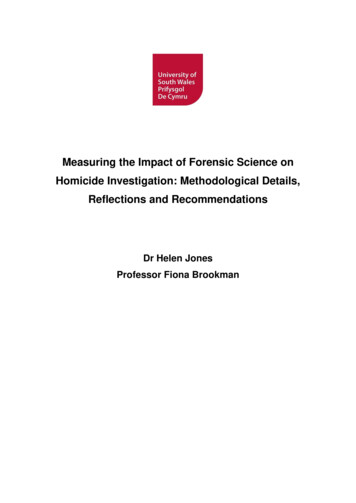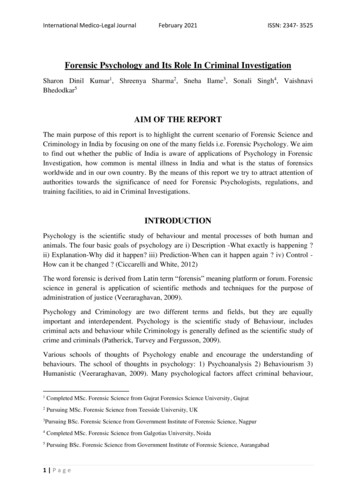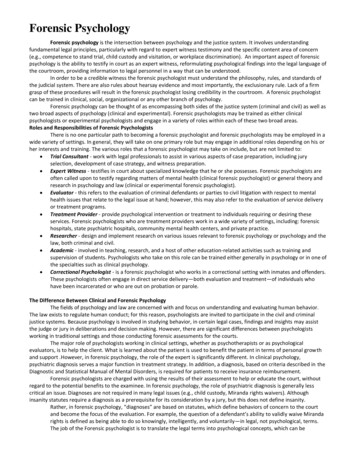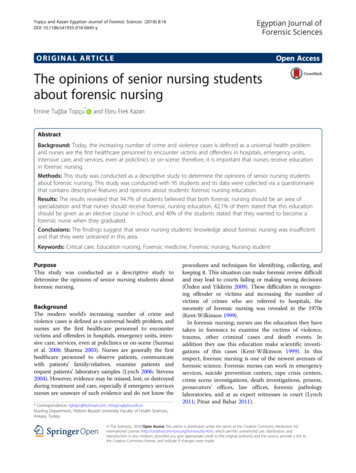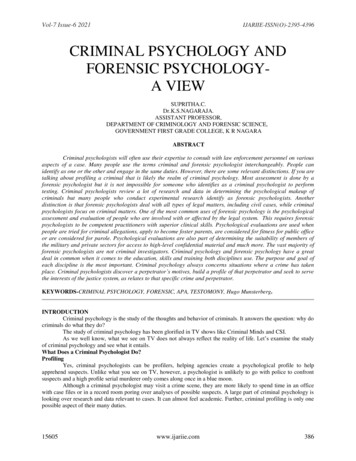
Transcription
Vol-7 Issue-6 2021IJARIIE-ISSN(O)-2395-4396CRIMINAL PSYCHOLOGY ANDFORENSIC PSYCHOLOGYA VIEWSUPRITHA.C.Dr.K.S.NAGARAJA.ASSISTANT PROFESSOR,DEPARTMENT OF CRIMINOLOGY AND FORENSIC SCIENCE,GOVERNMENT FIRST GRADE COLLEGE, K R NAGARAABSTRACTCriminal psychologists will often use their expertise to consult with law enforcement personnel on variousaspects of a case. Many people use the terms criminal and forensic psychologist interchangeably. People canidentify as one or the other and engage in the same duties. However, there are some relevant distinctions. If you aretalking about profiling a criminal that is likely the realm of criminal psychology. Most assessment is done by aforensic psychologist but it is not impossible for someone who identifies as a criminal psychologist to performtesting. Criminal psychologists review a lot of research and data in determining the psychological makeup ofcriminals but many people who conduct experimental research identify as forensic psychologists. Anotherdistinction is that forensic psychologists deal with all types of legal matters, including civil cases, while criminalpsychologists focus on criminal matters. One of the most common uses of forensic psychology is the psychologicalassessment and evaluation of people who are involved with or affected by the legal system. This requires forensicpsychologists to be competent practitioners with superior clinical skills. Psychological evaluations are used whenpeople are tried for criminal allegations, apply to become foster parents, are considered for fitness for public officeor are considered for parole. Psychological evaluations are also part of determining the suitability of members ofthe military and private sectors for access to high-level confidential material and much more. The vast majority offorensic psychologists are not criminal investigators. Criminal psychology and forensic psychology have a greatdeal in common when it comes to the education, skills and training both disciplines use. The purpose and goal ofeach discipline is the most important. Criminal psychology always concerns situations where a crime has takenplace. Criminal psychologists discover a perpetrator’s motives, build a profile of that perpetrator and seek to servethe interests of the justice system, as relates to that specific crime and perpetrator.KEYWORDS-CRIMINAL PSYCHOLOGY, FORENSIC, APA, TESTOMONY, Hugo Munsterberg.INTRODUCTIONCriminal psychology is the study of the thoughts and behavior of criminals. It answers the question: why docriminals do what they do?The study of criminal psychology has been glorified in TV shows like Criminal Minds and CSI.As we well know, what we see on TV does not always reflect the reality of life. Let’s examine the studyof criminal psychology and see what it entails.What Does a Criminal Psychologist Do?ProfilingYes, criminal psychologists can be profilers, helping agencies create a psychological profile to helpapprehend suspects. Unlike what you see on TV, however, a psychologist is unlikely to go with police to confrontsuspects and a high profile serial murderer only comes along once in a blue moon.Although a criminal psychologist may visit a crime scene, they are more likely to spend time in an officewith case files or in a record room poring over analyses of possible suspects. A large part of criminal psychology islooking over research and data relevant to cases. It can almost feel academic. Further, criminal profiling is only onepossible aspect of their many duties.15605www.ijariie.com386
Vol-7 Issue-6 2021IJARIIE-ISSN(O)-2395-4396ConsultationCriminal psychologists will often use their expertise to consult with law enforcement personnel on variousaspects of a case. For example, they can help them ask appropriate questions during interrogation or give relevantinformation to help guide their investigation.AssessmentAssessment is another critical aspect of criminal psychology. Performing psychological testing todetermine a suspect’s state of mind is an integral part of the adjudication process.For instance, a psychologist may have to determine whether a suspect is in a stable mental state to standtrial or if they have the personality characteristics to fit the alleged crime.ResearchCriminal psychologists may conduct research that has far-reaching practical implications on the study ofcriminology and the legal process.For example, psychologists have performed research on memory, eyewitness testimony, evidencecollection, and confessions that have impacted how law enforcement professionals and lawyers proceed in criminallegal cases.Court TestimonyCriminal psychologists often have to appear in court to provide expert witness testimony. There arepsychologists whose entire practice is based on giving their expert opinion.They base their judgments on testing they have conducted or through analyzing assessments and evidenceprovided by other professionals.PsychotherapyA criminal psychologist may also be asked to provide psychotherapy for people that have committedcrimes. Their role is to help their clients cope with the consequences of criminal behavior and assist them in theirrehabilitation so they can be productive members of society.TeachingA criminal psychologist can teach at the college level within a psychology or criminal justice department.Further, they can teach courses or present seminars at law enforcement training facilities, such as those run by afederal agency (e.g., the DEA) or the police.Criminal vs. Forensic PsychologyMany people use the terms criminal and forensic psychologist interchangeably. People can identify as oneor the other and engage in the same duties. However, there are some relevant distinctions.If you are talking about profiling a criminal that is likely the realm of criminal psychology. Mostassessment is done by a forensic psychologist but it is not impossible for someone who identifies as a criminalpsychologist to perform testing.Criminal psychologists review a lot of research and data in determining the psychological makeup ofcriminals but many people who conduct experimental research identify as forensic psychologists.Another distinction is that forensic psychologists deal with all types of legal matters, including civil cases,while criminal psychologists focus on criminal matters.Where Do Criminal Psychologists Work And What Do They Earn?Criminal psychologists usually split their time between an office and court but can also spend some time in the field,in settings like crime scenes and jails. Some work directly for government agencies, such as the police or FBI.Others have their own practice and work as consultants to lawyers and law-enforcement agencies. Manyare affiliated with universities. Criminal psychologists on average earn 93,440, which is more than most otherdisciplines of psychology.Their salary will largely depend on where they work and their specific duties. If they work directly for anagency they are likely to earn less than as a private consultant. Additionally, someone providing assessment andcourt testimony is likely to earn more than someone who primarily performs research.How Does One Become a Criminal Psychologist?First, you need to obtain an undergraduate degree, preferably in psychology. Next, you need to seekgraduate education.15605www.ijariie.com387
Vol-7 Issue-6 2021IJARIIE-ISSN(O)-2395-4396A minimum undergraduate GPA over 3.0 (and likely much higher) is probably needed to gain entry to agraduate program. Please note that criminal psychology is not recognized as an area of specialization by theAmerican Psychological Association (APA).That means you are not going to be able to receive an APA approved graduate degree in criminalpsychology.However, you can receive an APA approved degree in forensic psychology. If you do not enter a forensicpsychology program, it is recommended that you get a degree in clinical psychology and then specialize incriminology or forensics.Although you can find work with a master’s degree, finding a job as a criminal psychologist usuallyrequires a doctorate.Famous People In The Field Of Criminal PsychologyAlthough most criminal psychologists work behind the scenes, a few have gained notoriety for their role inapprehending high profile criminals or their contributions to criminal psychology.It should be noted that although not all of the following people are criminal psychologists by education,they all have performed or currently perform work consistent with a criminal psychologist.Hugo MunsterbergMunsterberg was an early pioneer in the field of criminal psychology. At the turn of the 20th century,Munsterberg published On The Witness Stand, a collection of essays which pointed out the inherent lack ofreliability in witness testimony.Munsterberg revealed how psychological variables can interfere with people providing evidence in trials.The study of eyewitness testimony has continued in psychology with the work of noted researcherElizabeth Loftus, among others. Munsterberg is also credited as one of the first people to study the importance ofjury selection.Thomas BondThomas Bond is widely believed to be the first criminal profiler. He was a physician who examined theevidence of victims believed to be killed by Jack the Ripper. Based on his investigation, he made certain conclusionsabout the psychological and physical makeup of the murderer.David CanterDavid Canter helped British police solve the famous Railway Rapist case in the 1980s. He is believed to bethe first person to use profiling to solve murders in England.He is also credited with creating investigative psychology, which combines psychological profiling withevidence derived from empirical scientific study.Saul KassinKassin’s scientific studies of false confessions are now used internationally to determine the validity ofpolice interrogation and the confession process.He is a Distinguished Professor of Psychology at John Jay College of Criminal Justice and MassachusettsProfessor Emeritus at Williams College, in Williamstown, MA.John DouglasJohn Douglas became famous working in the FBI’s serial crime unit. He was a profiler who worked onseveral high profile serial killer cases, including the Atlanta Child Murders and the Green River Killer.He was the model for Jack Crawford in Silence of the Lambs, a movie that spurred tremendous interest incriminal psychology. The current Netflix series Mindhunter is base upon his work.The Importance of Criminal PsychologyCrime is like a pebble in a pond, affecting a swath of people whenever it is perpetrated. Finding thoseresponsible and ensuring an accurate and ethical legal process has never been more critical.Through their invaluable work, criminal psychologists assist law enforcement in apprehending responsibleparties and help further educate about the criminal mind.Forensic psychology is a relatively young discipline that deals with the application of psychologicalprinciples, practices and clinical specialties within the legal arena.Recognized in 2001 by the American Psychological Association, forensic psychology combines aspects ofclinical psychology like counseling, interviews, evaluation, diagnosis and assessment with work inside the realm ofthe law and justice system.A broader, but still valid definition includes the use of other subfields and applications of psychology, likesocial psychology and development psychology, for legal applications.15605www.ijariie.com388
Vol-7 Issue-6 2021IJARIIE-ISSN(O)-2395-4396Forensic psychology is used in police departments, law firms, schools, rehabilitation centers, privatepractice and many other settings, but it isn’t used Forensic psychology is a broader and more diverse field thancriminal psychology.Applications of Forensic PsychologyOne of the most common uses of forensic psychology is the psychological assessment and evaluation ofpeople who are involved with or affected by the legal system. This requires forensic psychologists to be competentpractitioners with superior clinical skills.Psychological evaluations are used when people are tried for criminal allegations, apply to become fosterparents, are considered for fitness for public office or are considered for parole.Psychological evaluations are also part of determining the suitability of members of the military and privatesectors for access to high-level confidential material and much more.Because forensic psychologists are trained in psychotherapy, they can provide one on one therapy, groupand individual therapy and family psychotherapy. They are also trained to conduct interventions and de-escalatesituations.Forensic psychologists may work with patients within state or federal corrections systems, attorneys, offenders,crime victims, families or defendants. These are some of the common activities performed by forensicpsychologists: Psychological competency evaluations One-on-one psychotherapy, often with the victims or survivors of crime Sentencing recommendations Risk evaluations for recidivism and re-offending Evaluations for child placement and custody hearings Expert witness testimony Academia, including research and publication Law enforcement consultation Treating offenders, inmates and parolees Treatment of criminal offenders Provide advice and expertise in litigation Psychological evaluations of applicants for law enforcement Trial consultantsCRIMINAL PSYCHOLOGY V/S FORENSIC PSYCHOLOGYDue to the many television shows about criminal and forensic psychology, the precise scope of eachdiscipline has gotten thoroughly muddled in the general public’s mind. Although forensic psychology is sometimesincorrectly thought of as synonymous with criminal psychology, the two are different fields for different purposes.The vast majority of forensic psychologists are not criminal investigators. Criminal psychology andforensic psychology have a great deal in common when it comes to the education, skills and training both disciplinesuse.The purpose and goal of each discipline is the most important. Criminal psychology always concernssituations where a crime has taken place. Criminal psychologists discover a perpetrator’s motives, build a profile ofthat perpetrator and seek to serve the interests of the justice system, as relates to that specific crime and perpetrator.Forensic psychology involves a broader array of situations, many of which don’t involve crime atall. Forensic psychologists may work with witnesses to crimes, criminal offenders, and victims of crimes.Criminal psychologists are more focused, looking only at the perpetrator and aspects of the crime itself.Forensic psychologists do not profile criminal suspects or create behavioral profiles of perpetrators. Those tasks fallto criminal psychologists.Careers in Forensic PsychologyForensic psychologists must have a PhD or PsyD degree. In addition, forensic psychologists must have twoyears of supervised experience in the field and pass oral and written exams given by their state board of psychology.Starting out in the process of becoming a forensic psychologist, a person must earn a bachelor’s degree inpsychology, then proceed to graduate school. Some programs combine a master’s degree and doctorate into one,which takes four to five years to earn. It’s also possible to earn a master’s degree, then continue into a separatedoctoral program in forensic psychology.Note that to be licensed as a psychologist, it’s essential to have earned a PhD or PsyD.The following are common careers in forensic psychology at the master’s degree level: Licensed Associate Counselor or Licensed Professional Counselor. Counselors provide psychotherapy,conduct assessments, perform intake screenings, and work in a broad variety of settings.15605www.ijariie.com389
Vol-7 Issue-6 2021 IJARIIE-ISSN(O)-2395-4396Jury Consultant. Jury consultants collaborate with attorneys to help seat the best jurors for trial cases.Research Assistant. Master’s programs in forensic psychology typically have an element of researchinvolved in them. This can be a springboard to a career as a research assistant. Research assistants maywork with psychologists or attorneys in collecting and analyzing large amounts of information.Juvenile Offenders Counselor. Youthful offenders have typically been victimized themselves and need agreat deal of support to help them avoid re-offending.At the doctoral level, the following careers are available:Forensic Psychologist. Forensic psychologists perform the jobs discussed above. They may also workdirectly in the law enforcement system in jails or prisons as counselors. Within the corrections system,forensic psychologists assess inmates’ psychological well-being.Psychology Researcher. Professional research is a popular use of an advanced degree in psychology.There are many research and teaching opportunities in forensic psychology, due to the field’s ongoingexpansion.Expert Witness. Expert witnesses give legal professionals their input about the state of mind of an accusedperson; can make professional psychological research material easier to understand for juries and attorneys,and help juries view crimes in light of the latest research.Professor. People who earn advanced degrees are usually comfortable in academic settings, which makesteaching is often a great option for people who’ve earned a PhD in forensic psychology.CONCLUSIONCrime is like a pebble in a pond, affecting a swath of people whenever it is perpetrated. Finding thoseresponsible and ensuring an accurate and ethical legal process has never been more critical. Through their invaluablework, criminal psychologists assist law enforcement in apprehending responsible parties and help further educateabout the criminal mind. Many people use the terms criminal and forensic psychologist interchangeably. People canidentify as one or the other and engage in the same duties. However, there are some relevant distinctions. If you aretalking about profiling a criminal that is likely the realm of criminal psychology. Most assessment is done by aforensic psychologist but it is not impossible for someone who identifies as a criminal psychologist to performtesting. Forensic psychology is a growing field, with solid expansion on the horizon past 2026. As long as peopleinteract with the justice system, there will be job opportunities available for those in forensic psychology.REFERENCES Criminal Psychology (Topics in Applied Psychology)-by David Canter Current Perspectives in Forensic Psychology and Criminal Justice-by Curtis R. Bartol and AnneM. Bartol Criminal Psychology: Nature, Nurture, Culture:-by Ph.d. Miller, Laurence Forensic Psychology for Dummies-by David V. Canter and Ian Rankin Forensic Psychology: A Very Short Introduction-by David Canter, Ken Kliban Forensic Science In Criminal Investigation And Trials -by B R Sharma Forensic Science: A Beginner's Guide (Beginner's Guides)-by Jay Siegel SOCIAL MEDIA-ICT15605www.ijariie.com390
Forensic psychology is used in police departments, law firms, schools, rehabilitation centers, private practice and many other settings, but it isn't used Forensic psychology is a broader and more diverse field than criminal psychology. Applications of Forensic Psychology One of the most common uses of forensic psychology is the psychological .

